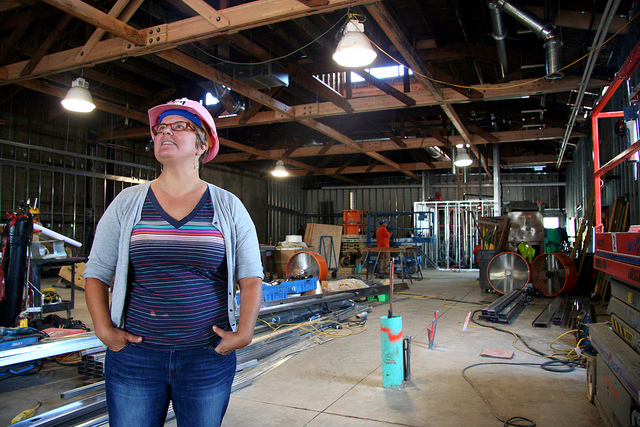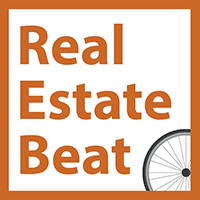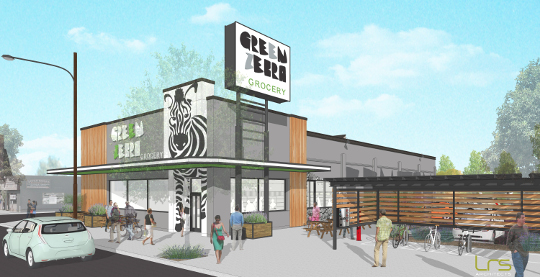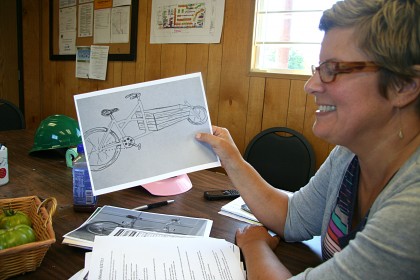Lisa Sedlar is on a mission to do for the Portland mini-mart what Burgerville did for fast food and New Seasons did for grocery stores.
Her plan starts in North Portland next month and is intended to expand to Southeast soon after.
Here’s what the plan looks like: A huge, curving salad bar area at the front of the room, with fresh grab-and-go sandwiches, four cook-from-scratch soups and freshly cooked Indian food. A “microroast coffee of the week.” A meat department that includes grass-fed beef. Beer, wine and kombucha on tap, with tables on the patio out front. All of it in 7,000 square feet.
And it’s not going to work, the CEO of Green Zebra Grocery says, without bikes.
“The model itself is built on the idea of a 20-minute neighborhood, so all your goods and services are built to be available within a 20-minute walk or bike,” Sedlar said in an interview last week in the construction trailer behind Green Zebra’s first location, which opens Oct. 1 at North Lombard and Peninsular in the Kenton neighborhood.
That’s why Green Zebra will offer:
- Bike trailers, available for overnight paid rental if you need to carry home more than you expected.
- An on-site cargo bike, which might be borrowed or even pedaled home (for a fee) by staff.
- A bike-up/walk-up window for sidewalk service.
- More on-site bike parking (20 spaces, including covered spaces and room for cargo bikes) than car parking (17, which is still quite a lot for a corner store).
- An on-site self-serve bike pump and maintenance stand.
- A bike innertube vending machine.
Sedlar, the former CEO of Portland-based New Seasons Market and before that a director of purchasing for Austin-based Whole Foods, said she’s been working on this plan for 10 years. (New Seasons is a small investor, she added.) She says it’s an entrepreneurial attempt to solve an eternal problem in the grocery business: how to generate more revenue per square foot of store?
“How do they return value to their shareholders?” Sedlar said. “They have to grow. So if all the ‘A’ locations have been picked, what are they left with? They’re left with ‘B’ locations, or changing their format somewhat.”
Here’s Sedlar’s big idea for a new format: slightly higher prices and narrower selection than full-size grocery stores, in exchange for more convenience and more health.
“The idea is that it’s not food for ‘those people,’ it’s food for everyone,” Sedlar said. “The idea of these stores is that it’s the new normal.”
She’s even decided that Green Zebra won’t carry cigarettes, a big decision for a small retail location, because “there’s just no way you can put the words healthy and convenient together and sell cigarettes.”
Sedlar’s projections assume that at least 30 percent of her traffic (she’s aiming for 400 to 600 trips per day) will arrive by something other than a car. In addition to the first location at North Lombard and Peninsular, she’s purchased further locations at SE Division and 50th, and SE Woodstock and 49th.
All are in commercial nodes near mixed-income residential areas that, two of which currently lack an immediate neighborhood grocer.
“They come in in the morning and they get a really good cup of coffee,” Sedlar said. “You grab a salad while you’re there, for lunch. And you come back on your way home and get a steak, a bunch of broccoli and a bottle of wine, and you’ll be on your way.”
If the model works, she plans to expand as quickly as possible elsewhere, including Seattle.
What might interfere? One obstacle in Kenton, Sedlar readily admits, is Lombard Street, a state-owned street that currently has two tightly spaced 35 mph auto travel lanes in each direction. It’s right out front.
Sedlar said that as part of the neighborhood group Friends of Lombard, Green Zebra is urging for the City of Portland to take ownership of Lombard. She’s also working with the city and state to install more painted crosswalks and better signals on Lombard.
“What’s interesting to me about that is that this is the way we used to shop: We used to shop more frequently and on a daily basis in our neighborhood. It just feels like that’s the way it’s meant to be.
— Lisa Sedlar, CEO, Green Zebra Grocery
“The neighborhood itself all through Kenton is super bikeable, super walkable,” Sedlar said. “It’s just Lombard that is a little bit scary.”
She’d also “totally support” removing auto travel lanes from Lombard in order to create more space for bikes and pedestrians.
“The thing is that safety comes first. and it’s never not going to be a main thoroughway,” Sedlar said of the street. “I would totally take away a travel lane. That’s what makes the most sense.”
Sedlar’s venture is exciting in part because it’s the latest vote of confidence by the private sector (including Green Zebra’s investors, who are putting up $3 million via loans and equity) in low-car life. When our local governments spend 40 years looking for ways to redirect their investment in auto infrastructure into a (cheaper) investment in bike, foot and transit infrastructure, it doesn’t destroy commerce. It just changes the way commerce gets done — which creates new opportunities for thoughtful risk-takers like Sedlar.
Though, as Sedlar points out, maybe Green Zebra Grocery is actually an old idea. Decades ago, the lot she’s renovating was … a Safeway.
“What’s interesting to me about that is that this is the way we used to shop,” Sedlar said. “We used to shop more frequently and on a daily basis in our neighborhood. And it’s similar to how agriculture has changed: we’ve gone from these big mono-agriculture farms to small family farms again, and we’ve gone from really big giant conventional hypermarkets to little small neighborhood stores again. It just feels like that’s the way it’s meant to be.”





